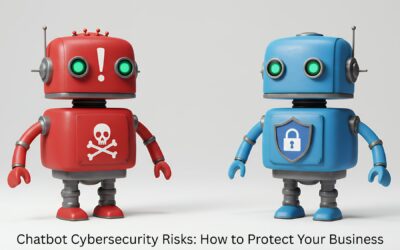Small businesses are vulnerable to cyberattacks, and bad cybersecurity habits can make things even worse. With limited resources and manpower, it’s crucial for small business owners and their employees to be aware of the bad cybersecurity habits that can put their businesses at risk. From weak passwords and phishing scams to unsecured mobile devices and a lack of data backup and recovery plans, we’ll provide actionable tips and advice for protecting your small business from cyberattacks. So, whether you’re a small business owner, manager, or employee, it’s time to help protect your job and business and start to break these bad cybersecurity habits today.
Bad Cybersecurity Habit #1: Weak Passwords – Weak passwords are one of the most common cybersecurity risks for small businesses. Employees often choose easy-to-guess passwords or reuse passwords across multiple accounts. To break this habit, small businesses should encourage employees to create strong, unique passwords and use a password manager to store and manage them. Additionally, implementing two-factor authentication (2FA) can add an extra layer of security.
Bad Cybersecurity Habit #2: Falling for Phishing Scams – Phishing scams are another common cybersecurity threat for small businesses. Hackers use social engineering tactics to trick employees into divulging sensitive information or downloading malware. To break this habit, small businesses should provide regular training to employees on how to identify phishing emails and avoid falling for scams. Encouraging employees to double-check suspicious emails with a manager or IT department can also help.
Bad Cybersecurity Habit #3: Ignoring Software Updates – Software updates often contain important security patches, so ignoring them can leave small businesses vulnerable to cyberattacks. To break this habit, small businesses should make sure that all software is up-to-date and that employees are aware of the importance of software updates. Utilizing automatic updates and software patch management tools can also help ensure that software is always up-to-date.
Bad Cybersecurity Habit #4: Not Securing Social Media – Social media accounts are often a weak link in small business cybersecurity. Hackers can use social media accounts to conduct social engineering attacks or to gather sensitive information. To break this habit, small businesses should encourage employees to use strong, unique passwords for social media accounts and avoid posting sensitive information on social media. Additionally, creating policies for social media use and training employees on social media security best practices can help.
Bad Cybersecurity Habit #5: Poor Remote Work Security – The rise of remote work has created new cybersecurity risks for small businesses. Remote employees may use unsecured networks or devices, making them vulnerable to cyber threats. To break this habit, small businesses should provide training to remote employees on how to secure their devices and networks, consider a secure VPN, and communicate the importance of following security policies. Implementing a remote work policy that includes security best practices can also help.
Bad Cybersecurity Habit #6: Unsecured Mobile Devices – Mobile devices are increasingly popular in the workplace, but they can also be a major security risk if not properly secured. To break this habit, small businesses should require employees to use strong passwords or biometric authentication on their mobile devices. Encouraging the use of mobile device management (MDM) tools can also help secure mobile devices.
Bad Cybersecurity Habit #7: Lack of Data Backup and Recovery Plan – Data loss can be devastating for small businesses, especially if they don’t have a backup and recovery plan in place. To break this habit, small businesses should create a data backup and recovery plan that includes regular backups of important data, as well as a plan for restoring data in case of a disaster. Utilizing cloud-based backup and recovery services can also help ensure that data is always safe and accessible.
By breaking these seven bad cybersecurity habits, small businesses can significantly reduce their risk of cyberattacks. Encouraging employees to take cybersecurity seriously and providing regular training and policies can help create a culture of security in the workplace. Remember, the best defense against cyber threats is a proactive and vigilant approach to cybersecurity by every tech user in your business. If you need help implementing security awareness training or getting an overall assessment of your current security posture, reach out for a free assessment.




